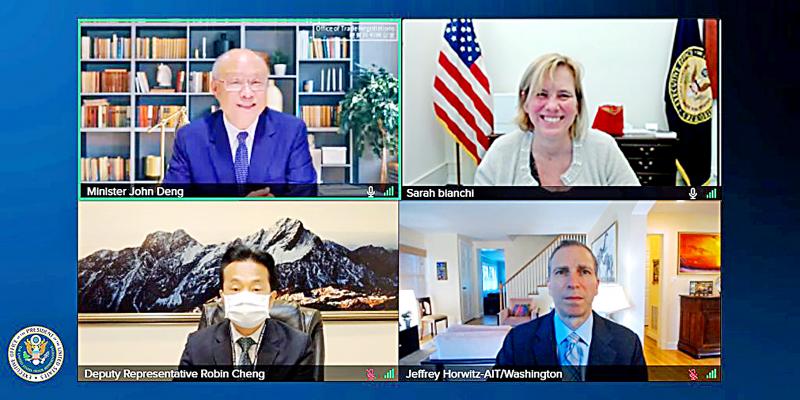The new Taiwan-US Initiative on 21st Century Trade has significant strategic implications, as it shows that Taiwan is a priority trading partner of the US and vice versa, Premier Su Tseng-chang (蘇貞昌) said yesterday.
The initiative, announced on Wednesday, is to provide a mechanism for economic and trade talks between the two nations in 11 areas, excluding tariffs.
It largely parallels the US’ Indo-Pacific Economic Framework (IPEF), which excluded Taiwan when it launched last week.

Photo: screen grab from Office of the US Trade Representative Twitter account
The first round of negotiations is to be held later this month in Washington, Minister Without Portfolio John Deng (鄧振中) told reporters on Wednesday following a virtual meeting with Deputy US Trade Representative Sarah Bianchi.
The initiative is “an important advancement in the economic relationship between Taiwan and the US,” Su told a Cabinet meeting yesterday.
It represents a new model of Taiwan-US engagement that not only provides a road map for signing a bilateral trade pact, but would also help the two nations develop a more comprehensive, substantive, cutting-edge and sustainable economic partnership, he added.
It would also be of great benefit to Taiwan’s efforts to join regional trade mechanisms such as the IPEF and the Comprehensive and Progressive Agreement for Trans-Pacific Partnership (CPTPP), as well as reaffirm the strategic significance of Taiwan and the US as each other’s priority trading partners, Su said.
Taiwan is an indispensable link in global supply chains, he said, adding that Washington realizes the need to bolster its economic ties with Taiwan to make global trade more resilient and secure.
Taiwan is also at the forefront of democracies’ fight against authoritarianism, with the Russia-Ukraine war making its strategic position even clearer, he added.
American Institute in Taiwan Director Sandra Oudkirk yesterday said that the institute is ready to support the advancement of the exciting initiative, which aims to develop concrete ways to deepen the US-Taiwan economic relationship.
In a Facebook post on Wednesday evening, President Tsai Ing-wen (蔡英文) wrote she was hopeful that the new bilateral trade initiative between Taiwan and the US would eventually lead to a trade agreement.
Separately yesterday, Chinese Nationalist Party (KMT) caucus whip William Tseng (曾銘宗) said the party was happy to see a breakthrough in Taiwan-US trade, but added that it is still only the beginning.
The framework still excludes the potential of a free-trade agreement, and does not guarantee that Taiwan would gain access to the CPTPP, he said.
KMT Legislator Johnny Chiang (江啟臣) wrote on Facebook that after Trade and Investment Framework Agreement talks with the US resumed last year, Taiwan had many times expressed its desire for a free-trade agreement and to join the IPEF, but neither has come to pass.
Negotiations on the new initiative have not even started and the content is still unknown, he said.
“The question is, what significant progress is being made? What are these significant results?” he wrote, accusing the Democratic Progressive Party (DPP) of using the agreement to score political points.
DPP spokeswoman Lee Yen-hui (李妍慧) hit back at the KMT, accusing it of discrediting the initiative because it does not want to see Taiwan-US ties improve.
Additional reporting by Lu Yi-hsuan, Jason Pan and CNA

The CIA has a message for Chinese government officials worried about their place in Chinese President Xi Jinping’s (習近平) government: Come work with us. The agency released two Mandarin-language videos on social media on Thursday inviting disgruntled officials to contact the CIA. The recruitment videos posted on YouTube and X racked up more than 5 million views combined in their first day. The outreach comes as CIA Director John Ratcliffe has vowed to boost the agency’s use of intelligence from human sources and its focus on China, which has recently targeted US officials with its own espionage operations. The videos are “aimed at

STEADFAST FRIEND: The bills encourage increased Taiwan-US engagement and address China’s distortion of UN Resolution 2758 to isolate Taiwan internationally The Presidential Office yesterday thanked the US House of Representatives for unanimously passing two Taiwan-related bills highlighting its solid support for Taiwan’s democracy and global participation, and for deepening bilateral relations. One of the bills, the Taiwan Assurance Implementation Act, requires the US Department of State to periodically review its guidelines for engagement with Taiwan, and report to the US Congress on the guidelines and plans to lift self-imposed limitations on US-Taiwan engagement. The other bill is the Taiwan International Solidarity Act, which clarifies that UN Resolution 2758 does not address the issue of the representation of Taiwan or its people in

US Indo-Pacific Commander Admiral Samuel Paparo on Friday expressed concern over the rate at which China is diversifying its military exercises, the Financial Times (FT) reported on Saturday. “The rates of change on the depth and breadth of their exercises is the one non-linear effect that I’ve seen in the last year that wakes me up at night or keeps me up at night,” Paparo was quoted by FT as saying while attending the annual Sedona Forum at the McCain Institute in Arizona. Paparo also expressed concern over the speed with which China was expanding its military. While the US

SHIFT: Taiwan’s better-than-expected first-quarter GDP and signs of weakness in the US have driven global capital back to emerging markets, the central bank head said The central bank yesterday blamed market speculation for the steep rise in the local currency, and urged exporters and financial institutions to stay calm and stop panic sell-offs to avoid hurting their own profitability. The nation’s top monetary policymaker said that it would step in, if necessary, to maintain order and stability in the foreign exchange market. The remarks came as the NT dollar yesterday closed up NT$0.919 to NT$30.145 against the US dollar in Taipei trading, after rising as high as NT$29.59 in intraday trading. The local currency has surged 5.85 percent against the greenback over the past two sessions, central